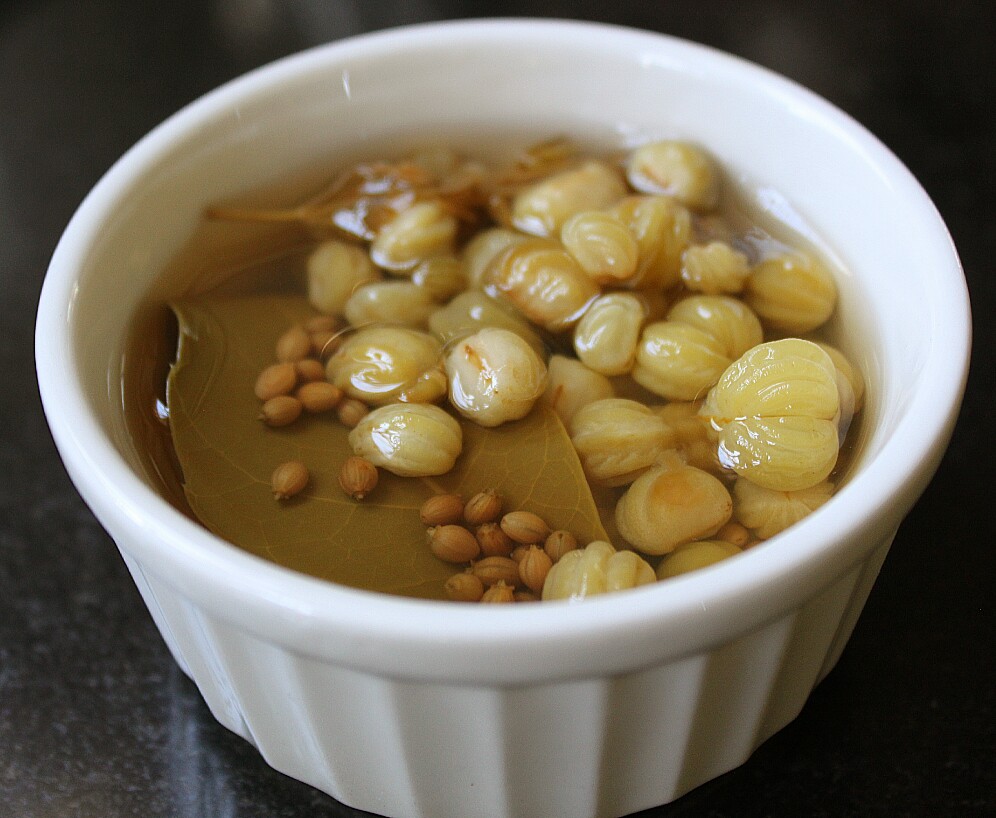Capers are a luxury in these parts … and I love capers. If I’m lucky I may find a small jar in a grocery store in town, but more often, I have to stock up on our infrequent visits to Johannesburg in South Africa, or Zambia’s capital, Lusaka, a mere six-hour drive from the farm.
I was expressing my frustration at the unavailability of this most prized of ingredients to my sister-in-law, Elizabeth, who came to live in Zambia at about the same time as I did. I told her out of desperation I’d even tried to grow my own caper bushes, but so far, none of them had germinated.
Had I tried nasturtium seedpods as a replacement? she asked. Nasturtium seedpods instead of capers? I’d never heard of them before. Outside, my garden was filled with nasturtiums, used as companion plants for my vegetables, as well as for their edible flowers prettying up my salads.

Elizabeth donated my first batch of immature nasturtium seedpods with which to experiment. I brined them in salt water for three days, and then after draining and washing in cold water, transferred them into a vinegar mix for a further five days. You can find the recipe at the end of this post.
They are delicious! The nasturtium seedpod is peppery and punchy like the caper, only slightly larger. What small variations there are between the two are of little consequence to me. I’m just delighted to discover that I grow the perfect substitute for an ingredient I use in many of my recipes. Thank you, Elizabeth!

The Latin term for the versatile nasturtium is nasus tortus, translated as “twisted nose.” That’s because, like its relatives mustard and garden cress, nasturtiums have a bite to them. The flowers make a flavorful and colorful addition to salads, while the young leaves can be turned into a bright green, pungent pesto. When you consider that nasturtiums are also packed with vitamins A, C and D, you know that this humble, hardy plant punches way above its weight.

I have a suspicion that the poet Robert Frost had a soft spot for nasturtiums, too:
Locked Out
As told to a child
When we locked up the house at night,
We always locked the flowers outside
And cut them off from window light.
The time I dreamed the door was tried
And brushed with buttons upon sleeves,
The flowers were out there with the thieves.
Yet nobody molested them!
We did find one nasturtium
Upon the steps with bitten stem.
I may have been to blame for that:
I always thought it must have been Some Hower
I played with as I sat
At dusk to watch the moon down early.

In the next post I will share with you my favorite potato salad recipe, inspired by a version in the award-winning Garden Cookbook by Sarah Raven. In it I use these nasturtium capers, spring onions from the garden, and my five-minute homemade mayonnaise.
Nasturtium Capers
Ingredients:
- 1/4 cup salt
- 2 1/2 cups water
- 2 cups immature nasturtium seedpods
- 3/4 cup rice vinegar
- 3/4 cup white wine vinegar
- 1 tablespoon granulated sugar
- 3-4 sprigs fresh thyme
- 1 tablespoon coriander seeds
- 2 fresh bay leaves, or 1 dried
Method:

